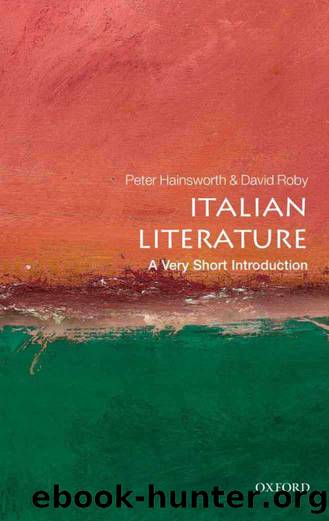Italian Literature: A Very Short Introduction (Very Short Introductions) by Peter Hainsworth & David Robey

Author:Peter Hainsworth & David Robey [Hainsworth, Peter]
Language: eng
Format: mobi
Publisher: Oxford University Press
Published: 2012-02-22T16:00:00+00:00
8. Elio Vittorini (right) with Alberto Moravia in the 1950s
Like Vittorini, the narrator and protagonist is a Sicilian, Silvestro, living and working in the north, who recounts a journey in which, in a state of depressed indifference and astratti furori (abstract furies), he leaves a bleak and wet Milan to visit his mother in Sicily. Most of the book consists of conversations with the characters encountered first on the train going south and then in Sicily, where he travels on to his motherâs cold, sunny village in the âpure heartâ of the island. The journey is both external and internal, material and moral, a âjourney in the fourth dimensionâ, as the narrator calls it. It is a process of inner awakening, the revival of the ability to respond and feel, and also one of progressive understanding. Silvestro learns from each of the emblematic characters he speaks with, and then moves on to learn something from the next, as the âwheel of the journeyâ stops and restarts. The reunion with his mother brings back childhood memories, and also his ability to respond to the world around him, in both its good and bad aspects. This raises the central question of the book: how does one retain the clarity of feeling, the âcertaintyâ that belongs to childhood, in the face of the extreme poverty and suffering of the mondo offeso, the offended or outraged world. His motherâs attitude of gruff practical charity is one answer, but plainly an inadequate one. So too is that of his companions in the next stage of the journey, who, in the course of an extended drinking bout in a cave-like tavern at the top of the village, both celebrate the beauties of the world and lament the offences that blight it. This act of lyrical effusion (Vittorini later associated drunkenness with âsubjectivity as an end in itselfâ) also leaves Silvestro dissatisfied, and is in turn superseded by an encounter with the ghost of his brother, a soldier who has recently died on the battlefield fighting, we may assume, with the troops that Mussolini sent to Spain to support Franco against the republicans. When the next morning the whole chorus of Sicilian characters assembles, the issue is now death in battle: to their question âIs it much to suffer?â, the dead man, speaking more within Silvestro than to the others, can only reply with an enigmatic âEhmâ. Silvestro has recovered his capacity to feel and respond emotionally and imaginatively, and can see that something needs to be done for the mondo offeso. It is the next and final stage that is problematic, as the âEhmâ seems to suggest. Action may result in pain and death, and it may be misguided. The novel ends in a final dialogue with the mother, whom he had compared to the Roman matron Cornelia, whose sons, the brothers Gracchi (both tribunes of the people), died for their country. She has now discovered the truth: as she says in the line at the head of this chapter, it wasnât on the battlefield that the Gracchi died.
Download
This site does not store any files on its server. We only index and link to content provided by other sites. Please contact the content providers to delete copyright contents if any and email us, we'll remove relevant links or contents immediately.
The Power of Myth by Joseph Campbell & Bill Moyers(1065)
Half Moon Bay by Jonathan Kellerman & Jesse Kellerman(987)
A Social History of the Media by Peter Burke & Peter Burke(985)
Inseparable by Emma Donoghue(983)
The Nets of Modernism: Henry James, Virginia Woolf, James Joyce, and Sigmund Freud by Maud Ellmann(911)
The Spike by Mark Humphries;(811)
The Complete Correspondence 1928-1940 by Theodor W. Adorno & Walter Benjamin(787)
A Theory of Narrative Drawing by Simon Grennan(778)
Culture by Terry Eagleton(775)
Ideology by Eagleton Terry;(741)
World Philology by(719)
Farnsworth's Classical English Rhetoric by Ward Farnsworth(715)
Game of Thrones and Philosophy by William Irwin(712)
Bodies from the Library 3 by Tony Medawar(709)
High Albania by M. Edith Durham(704)
Adam Smith by Jonathan Conlin(693)
A Reader’s Companion to J. D. Salinger’s The Catcher in the Rye by Peter Beidler(688)
Comic Genius: Portraits of Funny People by(652)
Monkey King by Wu Cheng'en(651)
